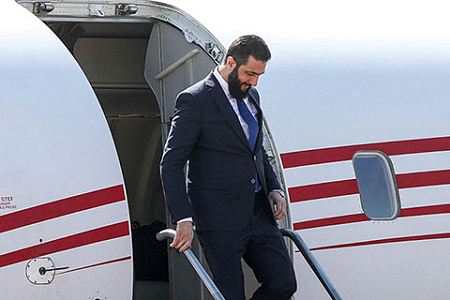
Saudi Arabia intends to repay Syria’s debt to the World Bank (WB). The debt is estimated at about $15 million. This will be the first major tranche of Saudi aid to the transitional Government in Damascus. The announcement of the monarchy’s readiness to repay the loan of the Arab Republic appeared on the eve of the visit that the President of the transitional period of Syria, Ahmed al-Sharaa, paid to Qatar– a rival power of the Persian Gulf with Saudi Arabia.
Sources told Reuters that Saudi Arabia is ready to pay Syria’s debt to the World Bank. Repayment of the loan may pave the way for the approval of multimillion-dollar reconstruction grants and assistance to the economy. As noted by Reuters, the payment of a debt of about $ 15 million will be the first case of direct financing of the Syrian transitional government by the Saudi ruling house.
The authorities in Damascus did not have the necessary amount in foreign currency, and the republic’s previous attempts to pay off the global organization with assets frozen abroad proved unsuccessful.
This week, representatives of the World Bank held talks in Damascus on the possible allocation of assistance for the restoration of the country’s energy infrastructure and payments in the public sector. The discussions covered purely technical issues, the resolution of which would help to unfreeze financial ties between Syria and the international community. The meeting with the technical group of the global regulator, which was led by Finance Minister Mohammed Yasir Barniya from the Syrian side, was the first open contact of this kind in recent years. Consultations are expected to continue: Syria has been invited to a joint forum of the International Monetary Fund and the World Bank later this month.
The message about Saudi Arabia’s assistance appeared on the eve of Ahmed al-Sharaa’s official visit to Qatar on April 15. The Syrian Foreign Ministry emphasized in its communiques that this Arab country “supported the Syrians from the very beginning,” referring to its uncompromising position towards the government of fugitive President Bashar al-Assad.
Perhaps the timing of the signals from the Saudi ruling house indicates the deepening competition of the Arabian states for this point in the Middle East. According to the Qatari portal The Middle East Eye, the collapse of the Assad government, which occurred on December 8, 2024, confused all the cards of the Persian Gulf countries and intensified their competition for Syria. Among the losers were the United Arab Emirates (UAE) and Saudi Arabia, which at one time normalized bilateral relations with the Assad government in the hope of preventing the expansion of the influence of Iran and Turkey. Ankara is now the main external support of Damascus. Qatar usually works in tandem with Turkey in foreign policy.
In March, it was reported that Qatar had volunteered to supply natural gas to Syria through Jordan. In this way, Doha wanted to help overcome the aggravated shortage of electricity. Despite the fact that the first planned supply was designed to generate 400 MW, the production volume was planned to increase depending on the needs of the Arab Republic’s energy system. “Qatar will support the Syrian energy sector and supply 2 million cubic meters of gas on a daily basis, which will help increase electricity supply in Syria by 2-4 hours daily,” said Omar Shakrouk, the Syrian Minister of Electricity in the transitional government.
The Arab powers agree that Damascus must be removed from international sanctions. So, earlier this year, speaking at the Davos Forum, Saudi Arabia’s Foreign Minister Prince Faisal bin Farhan stated that the Syrian nation bears a “huge burden of sanctions” that were imposed mainly because of “the actions of the previous regime.” “We have heard about some refusals (to ease the pressure. – “NG”) from the United States and Europe, – said the head of the Saudi Foreign Ministry. “I think more needs to be done.”
Riyadh noted that the Syrian transitional government demonstrates a real desire to “interact with partners in the region, with the international community,” and also shows openness to “move in the right direction.”
The hopes of the transitional leadership in Damascus are mainly related to the fact that the countries of the Persian Gulf will provide direct investments in the destroyed national economy. Turkey, the main sponsor of the Islamist groups that overthrew Assad in December, cannot fully undertake the restoration of its southern neighbor’s infrastructure: its economy is barely coping with the growing crisis. Separately, Damascus expects that with the help of the Persian Gulf countries, it will be able to establish normal contacts with the US presidential administration. As previously reported by sources of the Israeli channel i24, in May, Saudi Arabia expects to organize a personal meeting between Donald Trump and al-Sharaa on its site. Saudi Crown Prince Mohammed bin Salman is personally in favor of this, the interlocutors of i24 drew attention to.
